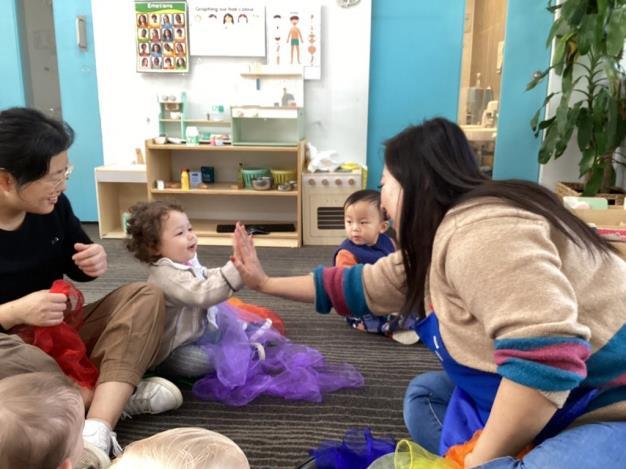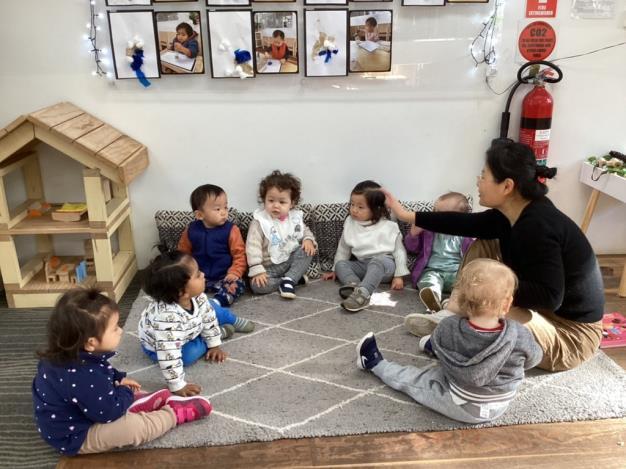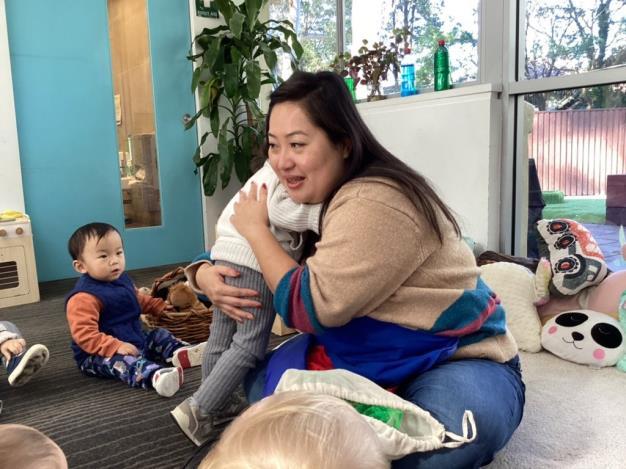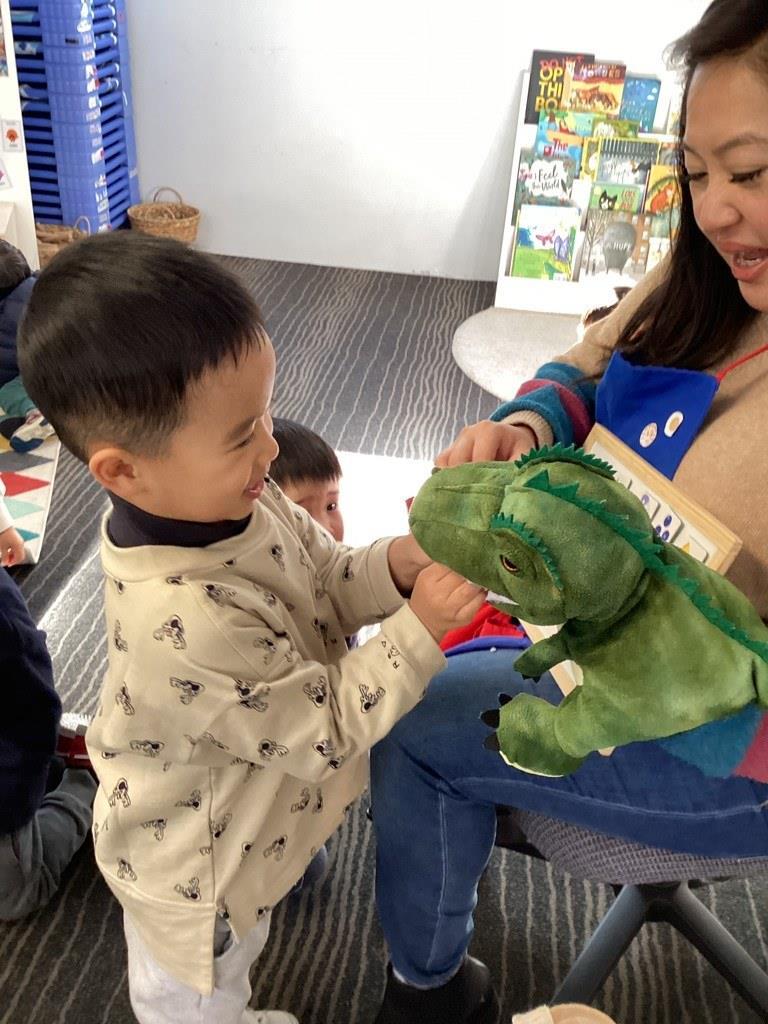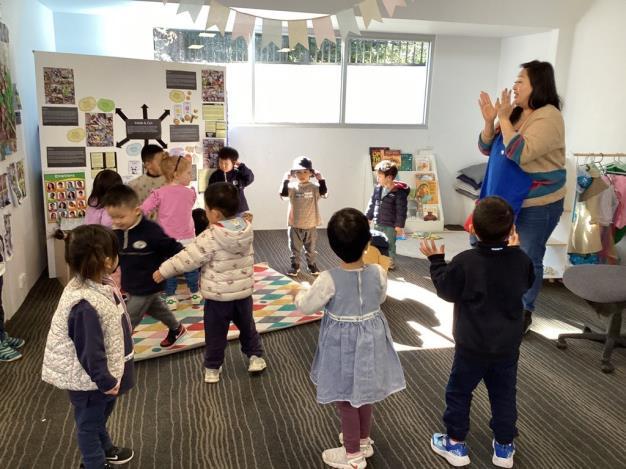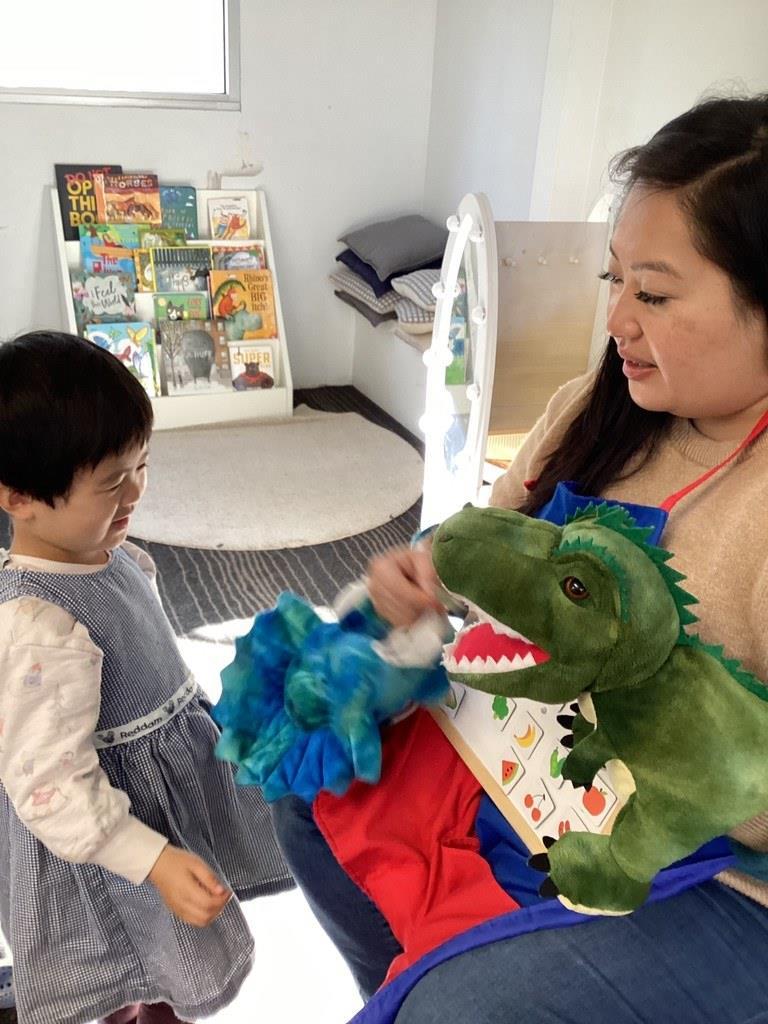Reddam ELS Lindfield Newsletter 30th

June 2023
Friday 30th June 2023
Principals Message by Christine IrwinDear Families
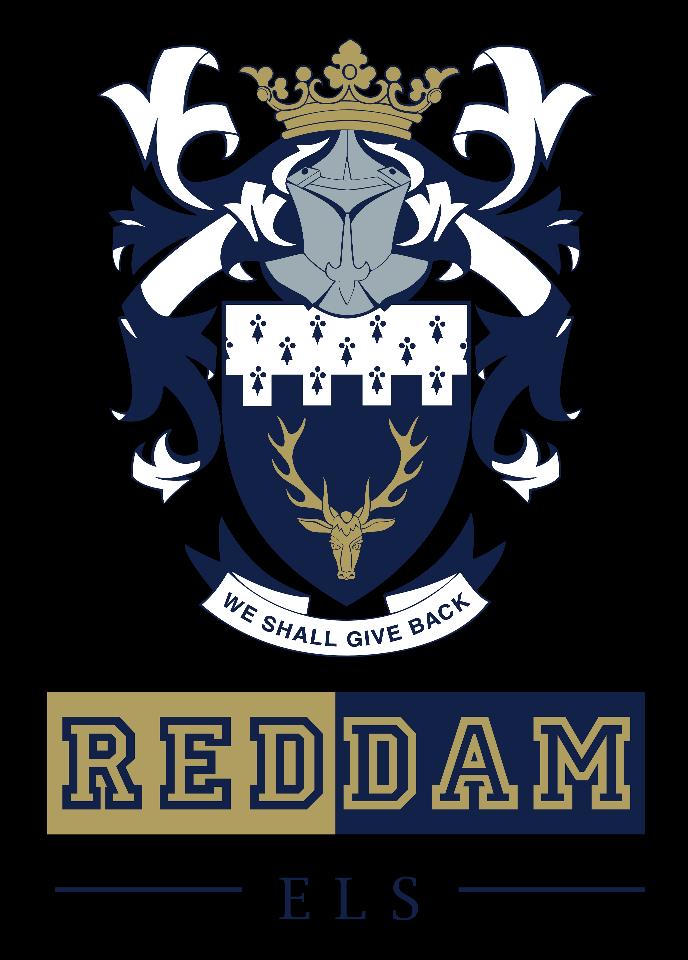
As our term draws to a close, the education team is rounding up the provocations and projects that the children have been researching over the last 10 weeks. It has been a wonderful Term 2 as we have seen many skills and concepts evolve across all stages. The children’s interests have inspired investigation into Saving Our Planet, Roles and Occupations, Feelings and Emotions, our bodies, all the way to ‘What’s Out There’ and buildings and constructions. Animals across the globe have also been a focal point in all our classrooms
It is alongside these Term 2 emerging interests which the educational team have curated our July Vacation Care Program with the intention of further inspiring the children’s curiosity and creativity among topics of their interest.
Our first week of VCP running from Monday 3rd July to Friday 7th July will see a focus and celebration of NAIDOC Week with a range of experiences to inspire and educate the children about Australia’s rich Indigenous history. The NAIDOC Week Committee and site explain the week as follows:
“National NAIDOC Week celebrations are held across Australia in the first week of July each year (Sunday to Sunday), to celebrate and recognise the history, culture and achievements of Aboriginal and Torres Strait Islander peoples. NAIDOC Week is an opportunity for all Australians to learn about First Nations cultures and histories and participate in celebrations of the oldest, continuous living cultures on earth. You can support and get to know your local Aboriginal and/or Torres Strait
Islander communities through activities and events held across the country.”https://www.naidoc.org.au/contact-us
Week Two has been inspired by the collective interest across all stages in creating. ‘What Can We Make?’ will see the children exploring construction, science, mathematics, food and agriculture. We are eager to see what each room comes up with as they explore STEAM concepts through fun creative, social, physical and investigative exploration.
Science, Technology, Engineering, Arts and Maths or ‘STEAM’ is an integral part of our learning program in Early Childhood education. Introducing these concepts to children from an early age in play based and engaging ways provides opportunities for children to be critical thinking, experimenters and build confidence from an early age.
MTA speaks about STEAM as ‘The focus on STEAM in early childhood has grown dramatically over the years with the rise of technology and an increased understanding of the importance of these areas for life and careers of the future (think problem solvers, explorers, creative thinkers. Think building resilience in kids to create resilient adults).’ - https://blog.teaching.com.au/what-does-stemmean-in-early-childhood/
We recently informed families that we have added an extra week of our July VCP and we are very excited about the planned provocations. ‘Whats Out There?’ will see the children exploring animals from all over the world including minibeasts, safari, ocean, rainforest and on the farm.
Thank you to all our wonderful children, families and of course our dedicated and hard working education team for another successful Term at Reddam ELS Lindfield. We are excited for the fun and learning over he next 3 weeks and looking forward to what Term 3 has to bring!
A quick reminder of upcoming dates
• Half yearly progress reports sent to families in the last week of June 2023
• Parent/ Teacher meetings held Mid July 2023
• Term 2 concludes on the Friday 30th June 2023
• Term 3 commences on the Monday 24 th July 2023
Look forward to speaking with you soon,
Christine Irwin, PrincipalStage 1R
Hello our dear families
Sniff, sniff, what can you smell? The children have been using their olfactory sense this week to investigate different smells. During the week we have presented to the children many different experiences to capture their sense of smell interest. It has been fun watching some of the expressions on their little faces as they eagerly lean forward to take a smell of what is on offer. Then you will either be rewarded with a huge smile and eyes light up as the realise they can smell something, or it is pushed back to you with a big shake of the head.
Some of the experiences we presented to the children this week included some delightfully smelling playdough, for those that enjoy the smell of coffee. We set up some coffee and cinnamon playdough with a coffee machine, cups and plates and allowed the children to engage in some dramatic play. Our little ones are progressing along beautifully in this area and they are all now enjoying using their creative sides while participating in dramatic play. How does dramatic play help a child's development? Drama gives children the opportunity to explore and the freedom to imagine. Through drama, children express themselves using different facial expressions, voices and tones, and body language. Drama empowers children to communicate confidently and it is also an effective way

“Children are not things to be moulded, but are people to be unfolded.” (Jess Lair)
of learning languages. Alongside of that there is the benefit of the social side, all that playing alongside of each other, commenting and sharing. All an important part of a child's development. Another of our playdough sessions during the week was flavoured with mixed herbs, yum that one made me hungry. This time we presented this with cookie cutters, rolling pins, plates and fresh potted herbs so the children could explore the fresh as well as those made in the playdough. During this experience we also were exploring their fine motor skills this time as they manipulated the playdough using either the rollers or the cutters to create shapes. What are fine motor skills in child development? Generally they are thought of as the movement and use of hands and upper extremities, fine motor skills include reaching, grasping and manipulating objects with your hands. Fine motor skills also involve vision, specifically visual motor skills, often referred to hand-eye coordination. But of course we do all these wonderful experiences not for those skills, we do it for the fun and enjoyment the children get out of them.
But I think the most popular event of the week was the lavender water experience in which we used warm water with some drops of essential lavender oil added. To complement the beautiful aroma this created we added some purple dye, purple glitter and some crushed purple cellophane. The children sat around this and using scoops they sort through the fluid mixture to find items to transfer to another container. And then is they wished they could transfer them back with the scoops or just pour it back into the original container. The children all enjoyed this and spent quite some time pouring the mixture back and forth.
Next week is our last week of term 2 and we will be using that week to revisit experiences the children have enjoyed the most. I know one of those will be the caring for the babies as that was very popular.
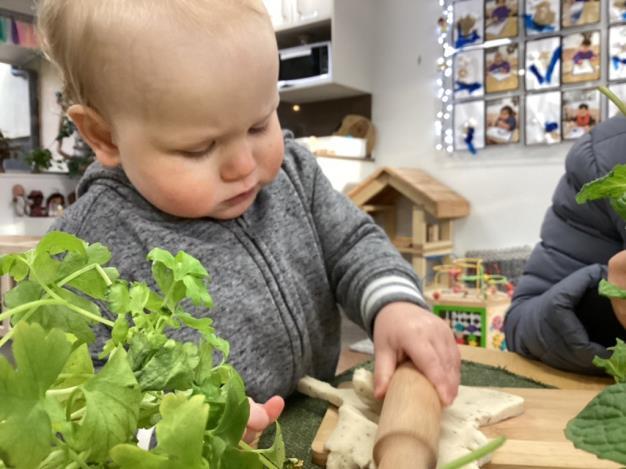
You will be receiving you 1/2 yearly reports as well and if anyone would like a brief interview to discuss, times will be offered.
Wishing all our families a wonderful weekend
Heather, Carina, Jing and Jaycel


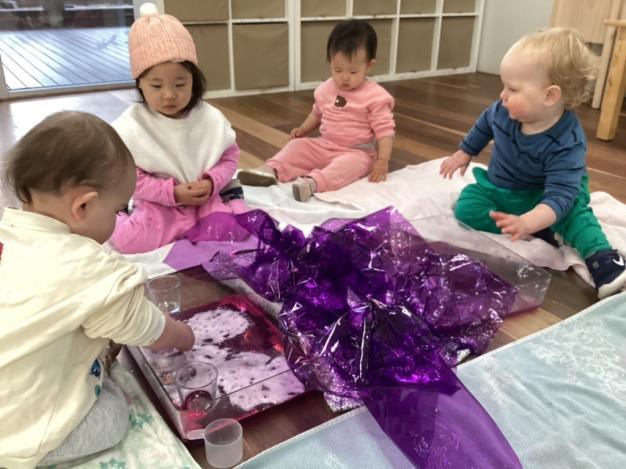






Stage 1E
In alignment with the children in Reptiles and Amphibians as part of our creative experience, the children were able to practice their pencil grip and hand-and-eye coordination the children made their own frog prints. We also introduced snakes and crocodiles into the learning experiences. This was a great introduction for the children to see and have an understanding of the world around them in the Reptiles world. We talked about how crocodiles live in water and snakes on land and we created their habitats in the tray we used water, sand, and green magic sand.
This week the children have been learning about reptiles which help children understand the importance of these creatures as part of our ecosystems. To further support the children’s interest, we will further provide them with stimulated habitats of animals filled with sensory materials. Children are able to absorb more knowledge by being active participants in their learning, through sensory learning experiences we will help the children develop their dispositions for learning and guide them in traversing the animal world.
Our Music and Movement group time allowed the children to dance and sing. This learning experience fosters physical skills like balance, control, and coordination and also benefits selfexpression as this can boost physical and social aspects.

Next week we will continue and add Dinosaurs.
Hope you all have a lovely weekend
'Play is the answer to how anything comes about ' -Jean Piaget
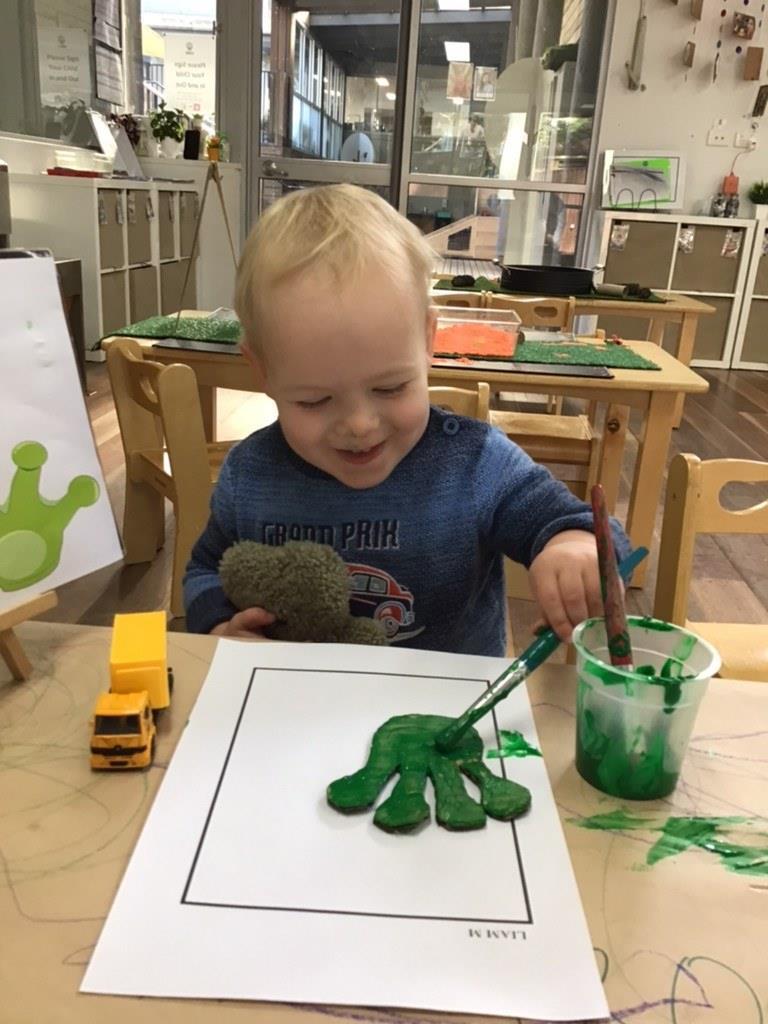
 Natalie & Resie & May
Natalie & Resie & May



Stage 2R
This week, the 2R children explored the complex and busy lives of farm animals. They enjoyed investigating the environment in which these animals live and deciphering their features. Children's learning benefits significantly from interactions with and care for animals. It offers them exposure to practical life skills they can utilise in the future.

2R engaged their imaginations and senses to learn more about farm animals using our various farmthemed sensory experiences. As they played, they invented worlds of their own where animals could talk; they practised their communication and used their dramatic play abilities to create their own stories. Playing with farm animals also enhanced their social skills when they played alongside their peers. The children had great fun pulling the pigs and piglets from the sticky mud and manipulating the muddy slime. This learning experience promoted fine-motor skills and investigation. Moreover, they showed great interest in cow-themed sensory trays using black and white slime along with cows that were hard to spot as they were almost camouflaged in the slime.
Furthermore, the teachers set up an engaging milking dramatic play station for the children to learn about where milk comes from. 2R would squeeze on a glove with tiny little holes in the bottom of the fingers to extract white paint from the “udders” to simulate milking a cow. Through pretend play,
“A child can teach an adult three things: to be happy for no reason, to always be busy with something, and to know how to demand with all his might that which he desires.
”
(Paulo Coelho)
children can learn a lot about themselves and the world around them. When the children are offered play-based experiences along with loose parts, their ingenuity truly surprises us. It shows that as adults, we don’t think outside the box nearly enough, and when we step back and allow the children to play and follow their lead, they can use their imagination and be active learners while creating their play. We believe in co-constructed learning and consider and treat the child's knowledge and understanding as valid while willing to share and develop our own ideas. This approach helps children be confident, take ownership of their learning, take risks and develop their creativity.


This term, the teachers took advantage of the bonds children form with animals and their fascination with all things related to nature and helped them develop essential life skills. We encouraged them to create a sense of empathy, responsibility and belonging within their world. 2R learnt about nature, ecology, and the value of protecting the environment while simultaneously developing these abilities by learning and caring for all these living creatures.
We hope you all have a lovely weekend!
2R Team



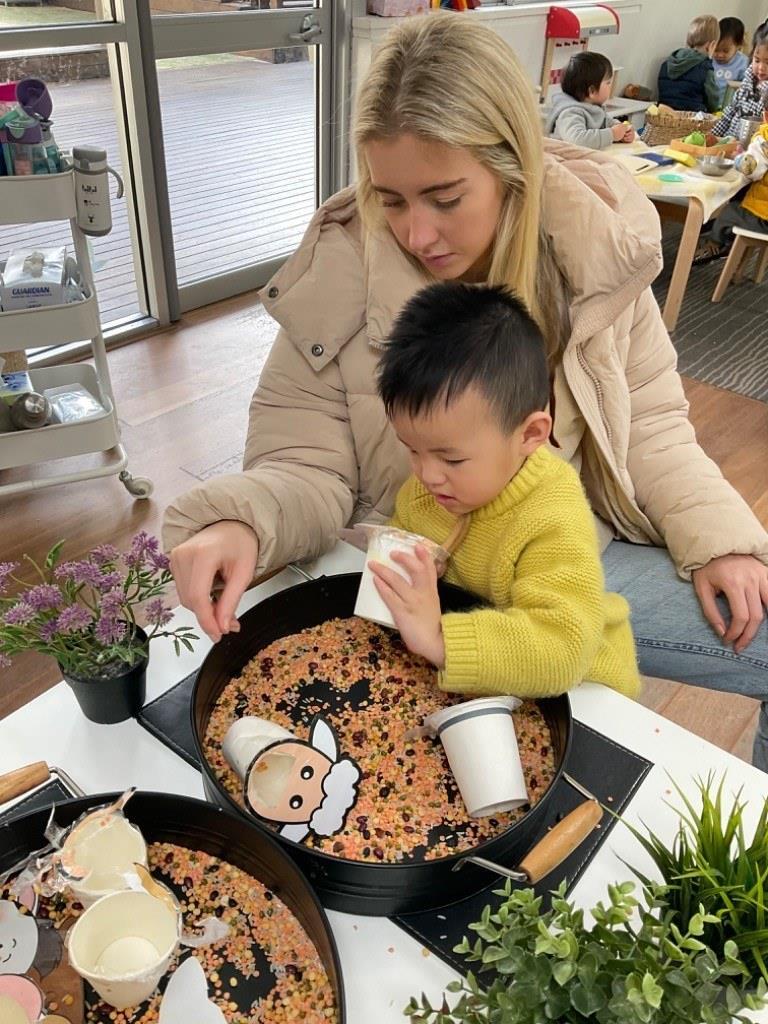


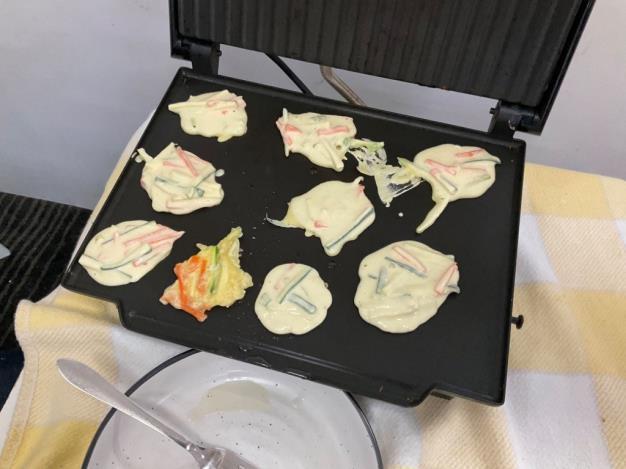
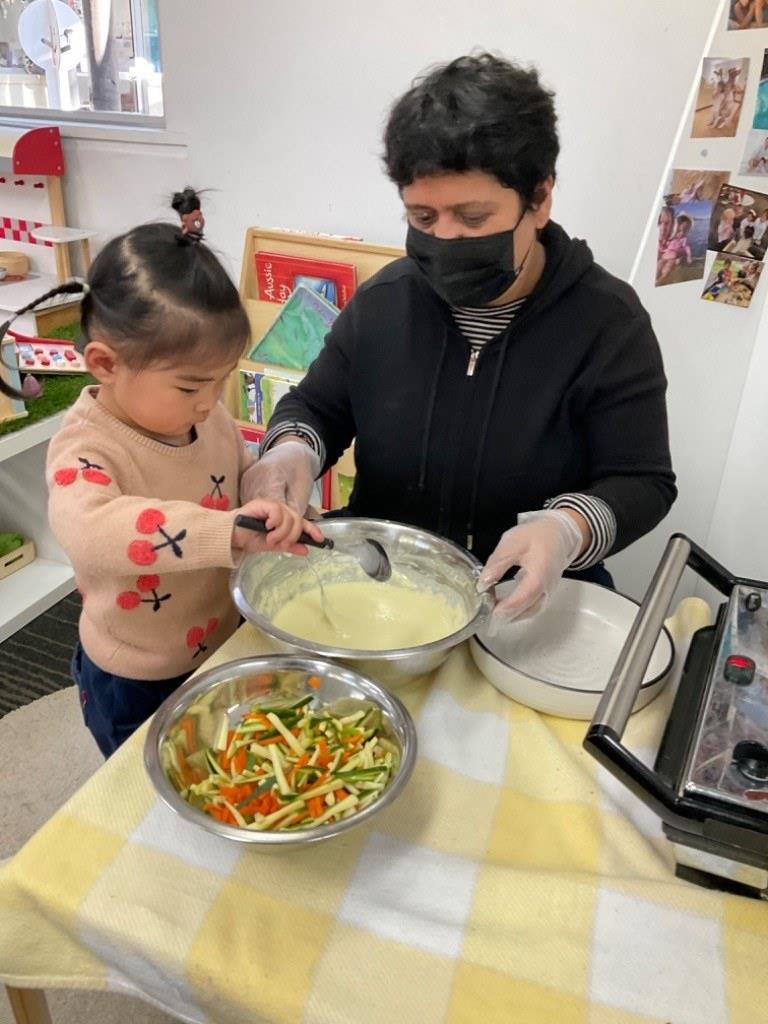

Stage 2E
“Cooking is just as creative and imaginative an activity as drawing, or wood carving, or music. And cooking draws upon your every talent - science, mathematics, energy, history experience” (Julia Child)

In Week 8, we explored a wide range of hospitality professionals including baristas, chefs, bakers, etc. Often, 2E children have shared and re-created their previous experiences of having babyccino with Mum and Dad or pretending to make healthy smoothies and juices in the kitchen corner. 2E children were invited to multiple sensory learning experiences that fosters the children’s fine motor skills, and early mathematical knowledge (measurement) and helps the development of their sense of smell as well as their sense of touch and sight. The children were offered a tray filled with pungent coffee beans and tools which allowed them to transfer the beans from one cup to another, they also were invited to use a spoon to pour the beans into a jar.
To extend this fun experiment, 2E children were invited to cook or bake with natural ingredientssand and mud. These opportunities inspire children to feel a connection to nature and develop an appreciation for the environment. The open-ended resource enhanced the children’s creativity and imagination as they can cook multiple dishes from sand, chocolate cake, rice, noodle, pasta, cupcake and so much more.
After reading Can I Lick the spoon now? by Carol Goess and Tamsin Ainslie, the children wanted to try to make a chocolate cake. We used the visual images in the book to help us check whether we had enough ingredients or not, sugar, flour, cocoa, baking powder, oil (replacing eggs), vanilla extract, butter, a big bowl, a spatula, and trays. Our little bakers used their sharp eyes to observe and made sure that we got everything we need. While scooping and mixing, we counted together and observed the change in our mixture. It was white, then turn brown. It was light with powder then turn heavy and sticky when we pour milk in. The children noticed the difference while lending a hand. They contributed:
- Kylie: "It is so heavy."- Reyaan: "I was so light then now heavy (to mix)"- Charlie: "It is brown."Erika: "You do like my mum."- Millie: "I want to try."- Hayden: "Oh! It's so sticky."- Henson: "Wow! I want to eat it."- Ira: "Can I try?"
On another day, Miss Chloe invited us to make Korean pancakes. The children were introduced to Korean cuisine through the activity of making vegetable pancakes (Pa Jun) with the guidance of Miss Chloe. Through hands-on exploration, they had the opportunity to taste, smell, and learn about these vegetables. This exposure helps expand their knowledge of different foods and promotes a sense of curiosity.
Inspired by the story Made with Love by Susie Linn and Sally Garland. In the story, the grandma and granddaughter work together to create a special cake with many secret ingredients. We decided to work together as a class to make three-ingredient scones! These scones have their secret ingredient. Then, we started to measure and pour. Each child had a turn at adding the ingredients to the bowl. We started with flour, then baking soda, then cream and the secret ingredient: lemonade. We mixed everything to form a dough and then flipped the dough onto our table to knead it. We had to roll our dough into balls and place them on the tray for Miss Jazzy to cook for us.
Excitingly, we also made fettuccine pasta from scratch and enjoyed a cup of hot chocolate on a cold day. What an excellent way of learning through hands-on experience and senses.
Have a wonderful weekend,
2E Team












Stage 3R
Dear Families,
Co-construction of knowledge is where children learn and extend their knowledge by engaging in reciprocal learning relationships, this can also occur between children and educators (Vygotsky). This week as a class we engaged in many discussions and experiences that led to the co-construction of knowledge surrounding cooking, chemical reactions and sustainability.
One of our focused small groups this week saw the children learning about the importance of saving water. These experiences saw children watching an educational video which detailed the reasons we need to conserve water and ways in which we can in our everyday lives. The children took these ideas on as they were able to reiterate what they learnt throughout the week. The children then sorted and categorised different methods of water conservation by sticking them on the ‘wasting water and saving water’ posters. Notably, the children demonstrated peer-scaffolded learning as they helped their peers decide where to categorise the different pictures and engaged in rich discussions debating what they thought and why. It was great to see when the experience was

“[Sustainable practices] important role to in building resilience and capabilities in children that equip them as active and informed citizens now and in the future and who are capable of contributing to healthy and sustainable ways of living.
”
(Davis, 2010)
repeated throughout the week that the children became more confident in their choices and were able to justify their decisions also.
Another learning experience that the children thoroughly enjoyed was making pizza from scratch! The children in the previous week made their own pizza dough and used their observation skills and five senses to explore the differences between yeast dough and plain flour dough. From there, this week the children made another yeast pizza dough and this time we made edible pizzas. The children in the previous week explained what they liked best on their pizzas, as a result, we bought those ingredients and encouraged them to cut them up themselves and put them on top of the pizzas. The result was delicious! The children were able to extend their hand-eye coordination and fine motor skills as they use real knives and chopping boards to cut up the pineapple, mushrooms, capsicum and zucchini to sprinkle on top.

Grace, Jenny & Charity.












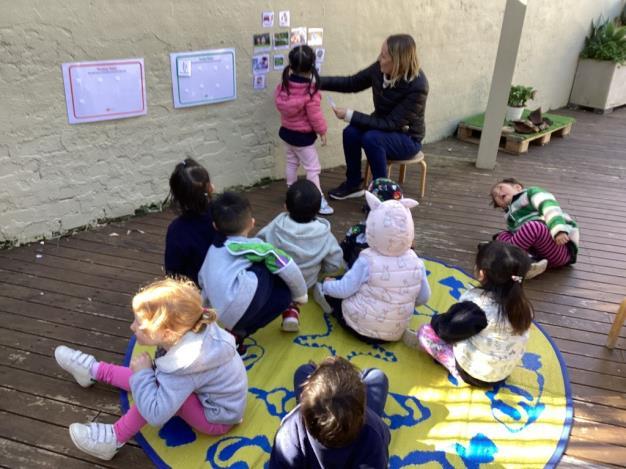
Stage 3E
During Week 8, the children have proceeded to engage with various materials and objects to build and construct different buildings from. They showed lots of interest in using collage pieces and


“The important thing is not to stop questioning” - Albert Einstein (n.d.).
cellophane to make temples and other sacred places. This allowed the children to think about the shapes they were cutting out to represent their emerging thoughts and ideas. The children also enjoyed comparing the similarities and differences between each other's drawings and interpretations. The children demonstrated great levels of enthusiasm, interest and curiosity towards the different temples they could observe.
Throughout the week, the children continued to explore and investigate with native Australian animals by reading a wide range of picture books, which enabled them to recognise and identify different animals, and determine where they live, what they eat and even how they move in the wild. The children enjoyed connecting these books to their real-life experiences with where they have seen these animals before, as well as being able to use loose part materials to create habitats for them.
Also, during the week, the children were provided with a great challenge to try and work together to build and construct a building. They were able to choose the objects and materials they wished to use within their play space, as well as experiment with height, width and length. Some of the children were eager to make the tower tall, where others tried to make it long and wide. This allowed the children to use their engineering minds and begin to think critically about how certain pieces connect together and why.

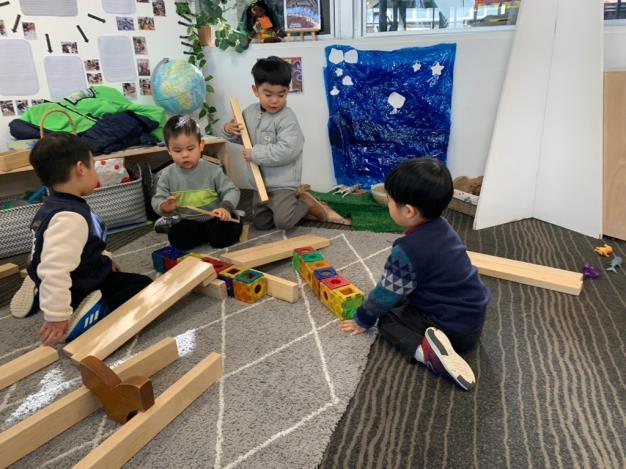
We hope you all have a lovely weekend,
Laura, Kai & Nika






Stage 4R
This week's learning all started with our last week's exploration of firefighters, this curiosity led them to express interest in other emergency service personnel. We followed their voices and embarked on an exciting journey to learn about the occupation of paramedics.
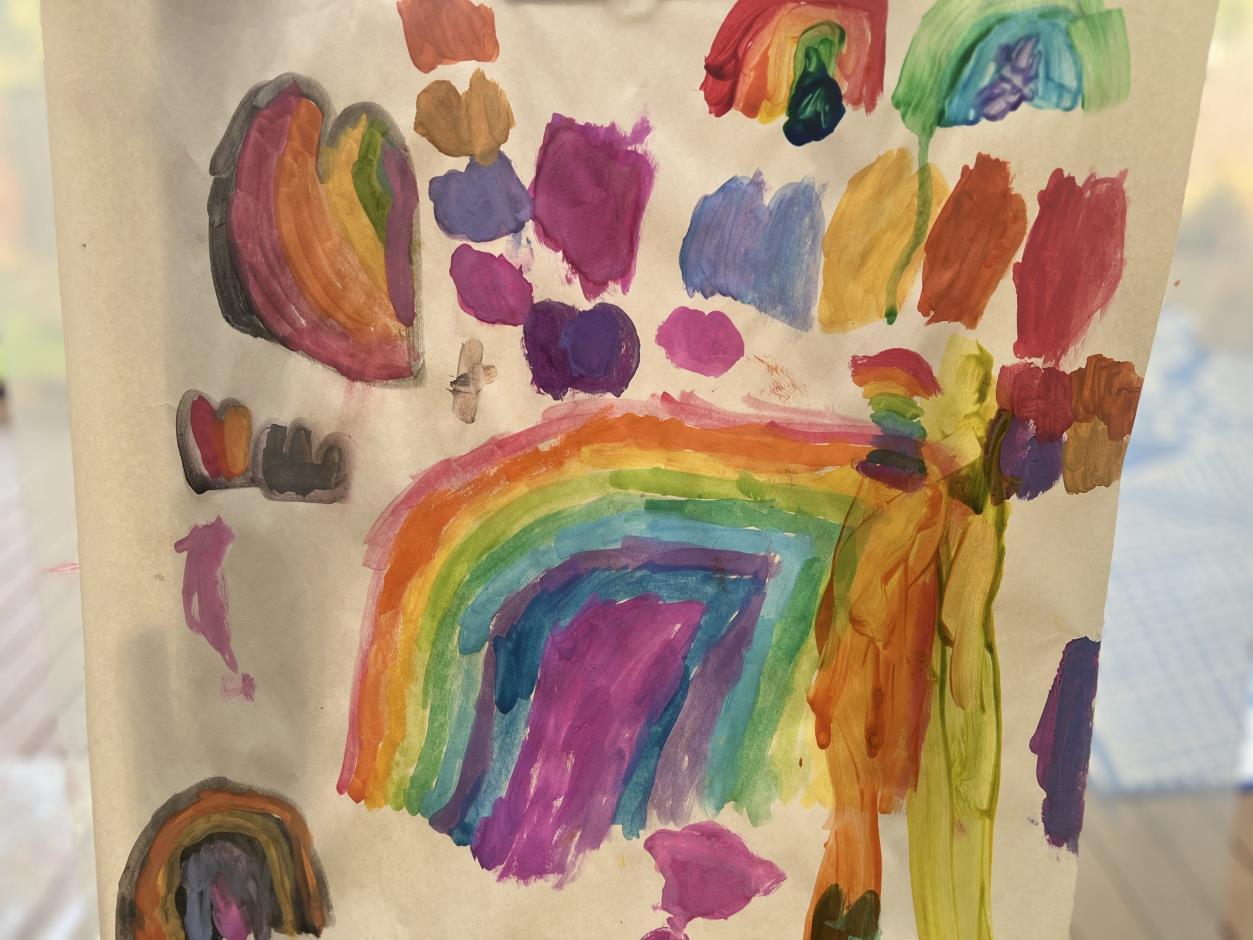
The week began with a fascinating exploration of a first aid kit. We introduced a real first aid kit and discussed its purpose in providing immediate care for injuries. The children eagerly examined the items inside, such as band-aids, gauze, and antiseptic wipes, as we discussed their uses and when to use them. Prior to opening the first aid kit, we engaged in a lively group discussion about what the children thought would be inside. Their insights were impressive, with children mentioning the application of band-aids for injuries and others suggesting the presence of medicine.
Meanwhile, we followed up with another engaging activity, the children worked together to create a class ambulance. They enthusiastically glued and cut paper to match the shapes on the ambulance photo. Children suggested vibrant colours for the ambulance, while other peers shared ideas of including special tools inside. Children also reminded their teacher of the ambulance's vital role in
“The world of pretend play is one in which children can be free to express themselves, their ideas, their emotions, and their fantastic visions of themselves, of other people, and of the world." (Sandra Russ)
transporting people to the hospital. Their collaboration and attention to detail were evident, resulting in a unique and vibrant class ambulance that showcased their individual contributions.
However, the highlight of the week was the dramatic play centred around ambulance role play. The children took great pleasure in setting up a hospital play area, complete with a toy ambulance, a doctor's kit, and bandages demonstrating their understanding of how to use the items from the kit. They assumed different roles, such as ambulance drivers, paramedics, and patients. Throughout the day, they acted out various scenarios that required the presence of an ambulance. Some children played dedicated patients, with others pretending to have a high temperature and portraying someone with broken bones. The hospital was bustling with doctors, including who diligently took temperatures. They showed great care and compassion by bandaging up their friends. It was a day filled with learning, empathy, and teamwork. This interactive experience not only enhanced their knowledge of first aid but also encouraged their imaginative thinking and creativity.
We are thrilled to witness the children's growing understanding of different occupations and their ability to engage in imaginative play. Their enthusiasm and active participation have been truly remarkable.

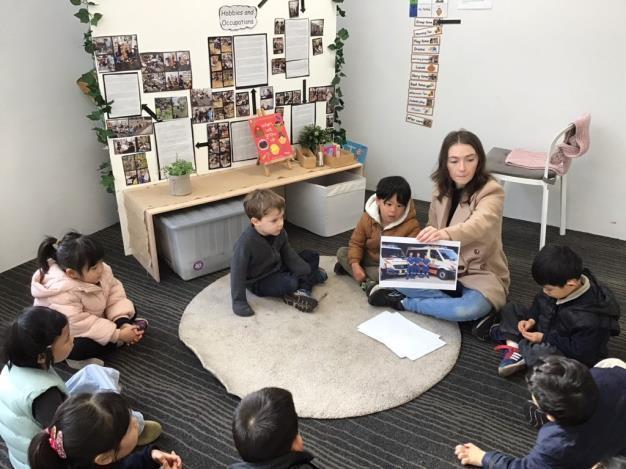
We look forward to another week of exploration and growth together.
Warm wishes,
Miss Sarah, Mr Callum and Ms Margaret


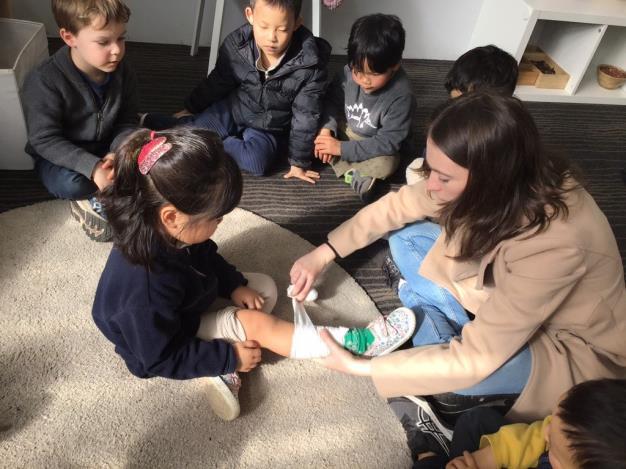
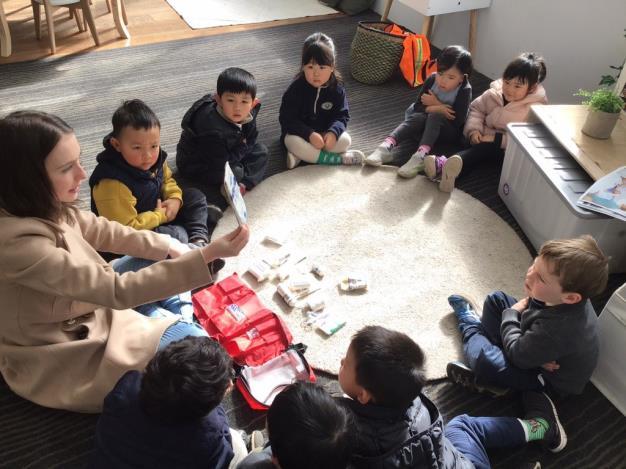
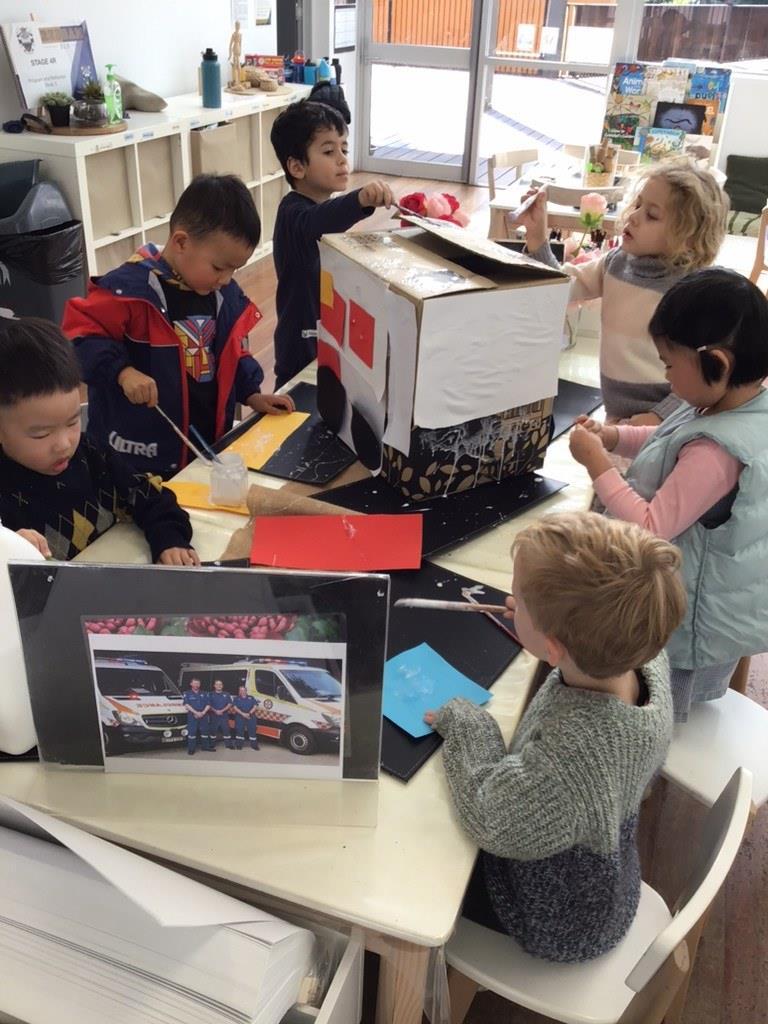



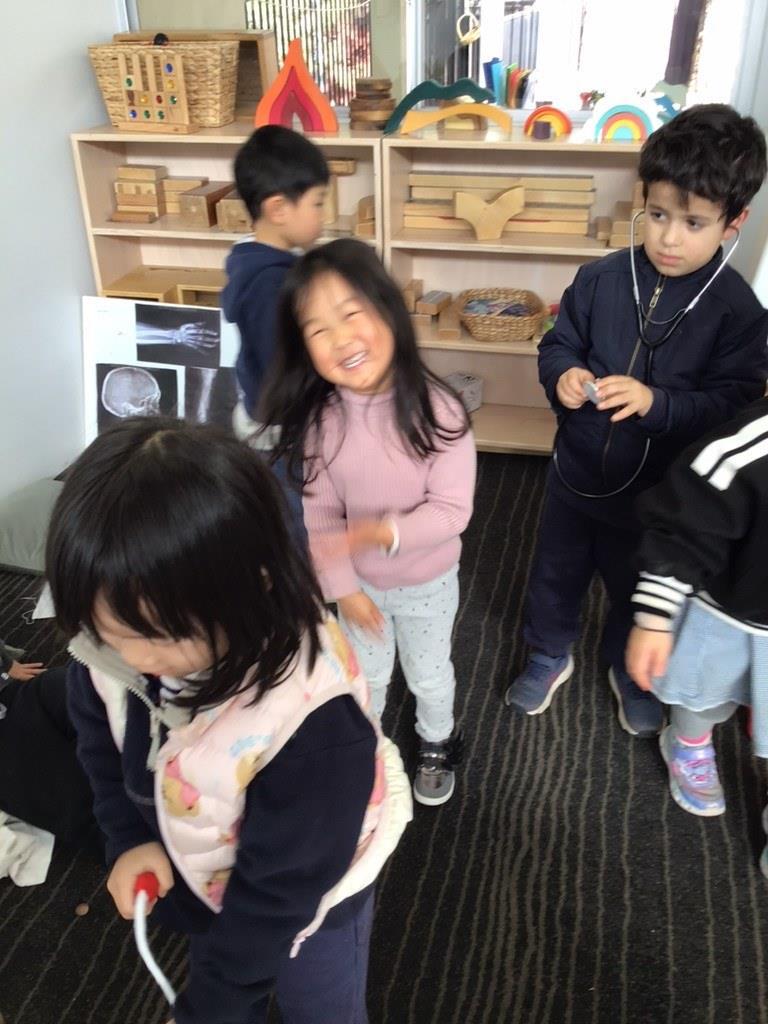



Dear Families,
This week we travelled to South America to explore The Amazon Rainforest and the animals that inhabit it. During our morning group times the class learnt the names of many animals that live across this continent including, the toucan, macaw parrot, capybara, anaconda, caiman, tamarin, marmoset, sloth, flamingo, river dolphin, howler monkey, chameleon and iguana, just to name a few.

The children were so curious about the different parts of the Amazon, so we looked at a diagram of the rainforest layers learning that there is the river, forest floor, understory, canopy, and emergent layer. The canopy creates a ceiling preventing the sun from shining though, however many of the plants can survive in the humidity and darkness. During the children’s small world play they created the rainforest layers using a variety of faux plants, leaves, flowers and wooden resources. Toucans and parrot figurines were placed up high at the top of the trees, sloths hung from the giant palms, and the land animals were dotted around the play space in their animal groups. Their small world play also prompted the children to create their own stories based on the fun facts we learnt about each animal throughout the week.
Our story of the week was called One Day on Our Blue Planet in the Rainforest by Ella Bailey, about a spider monkey who ventured through the Amazon and met lots of different animals. The children identified them as we saw them in each illustration. We read a hilarious story book called Poo! Is
“Curiosity is the very basis for education.” (Arnold Edinborough )
That You? by Clare Helen Welsh and together we identified many smelly animals including an anteater, a skunk, sloth, stink bug, stink bird and the smelliest flower in the whole world - the giant pelican flower. We also learnt that many of these animals use their scents to mark their territory, warn predators away and to protect themselves from being eaten.
Our table experiences included, counting with miniature animals to practise one-to-one correspondence, copying and writing jungle-themed topic words, and manipulating green play dough to create interpretations of jungles. The children enjoyed another round of “Jungle Bingo” to promote the use of visual discrimination skills and cognitive development, and their language and vocabulary was supported as we explored verbs and adjectives to describe each animal. Our “Jungle Scavenger Hunt” proved to be another hit. This week, 18 animals were stuck around our campus and the children located each one on their sheet. Some animals were trickier to spot, especially the smaller monkeys who look very similar to each other. Each afternoon we also concluded our day with some fun and vibrant songs including ‘The Toucan Song,’ and ‘Karma Chameleon’ by Culture Club, which we shook our shaker eggs to. A giant snake prop also joined us as we passed it around our music circle whilst chanting our ‘Green Anaconda’ song.
It’s been a busy but productive term, and we want to thank the children and their families for all of their kindness and positive feedback. We look forward to Term 3 and continuing our learning journey together.
 Lauren, Rowel and Rebecca
Lauren, Rowel and Rebecca




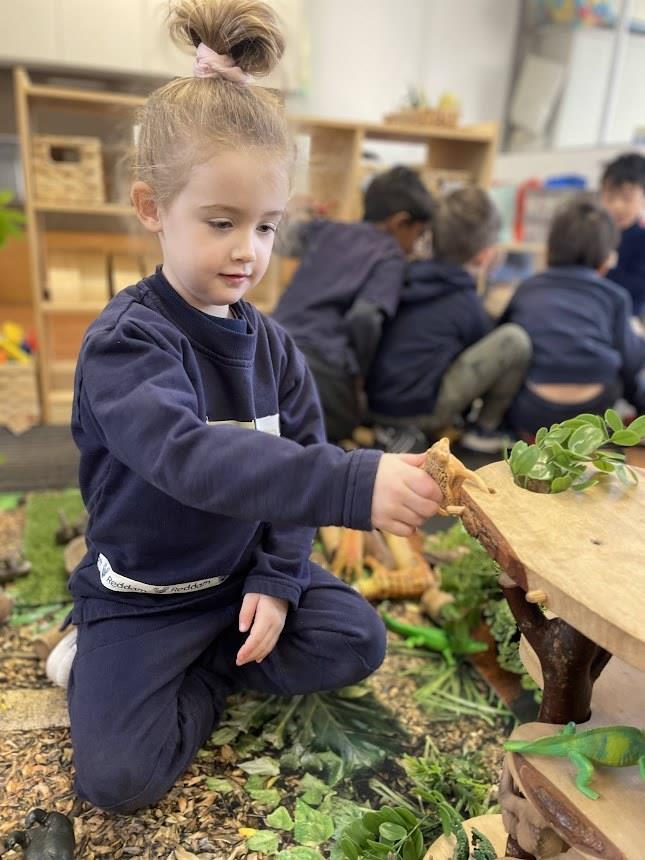
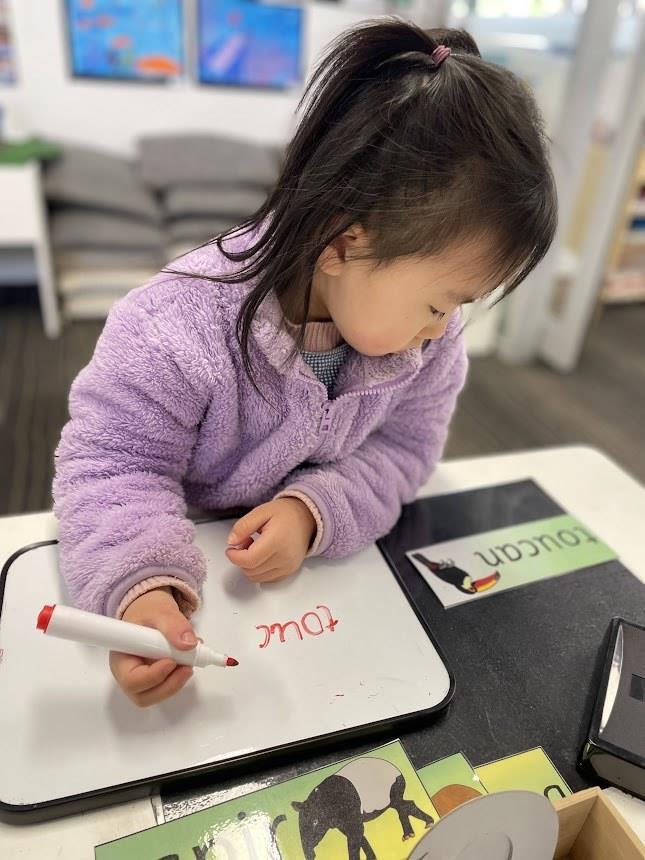
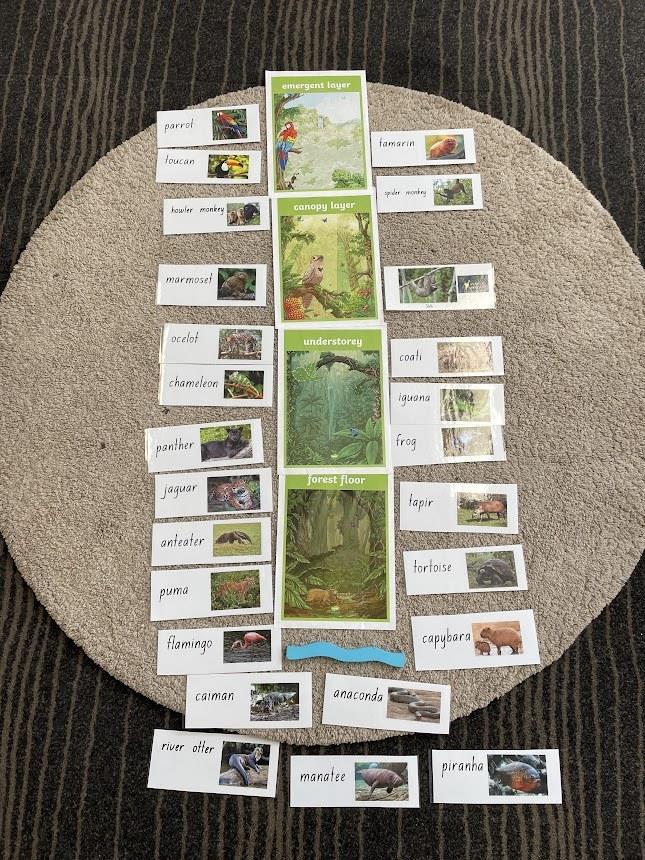




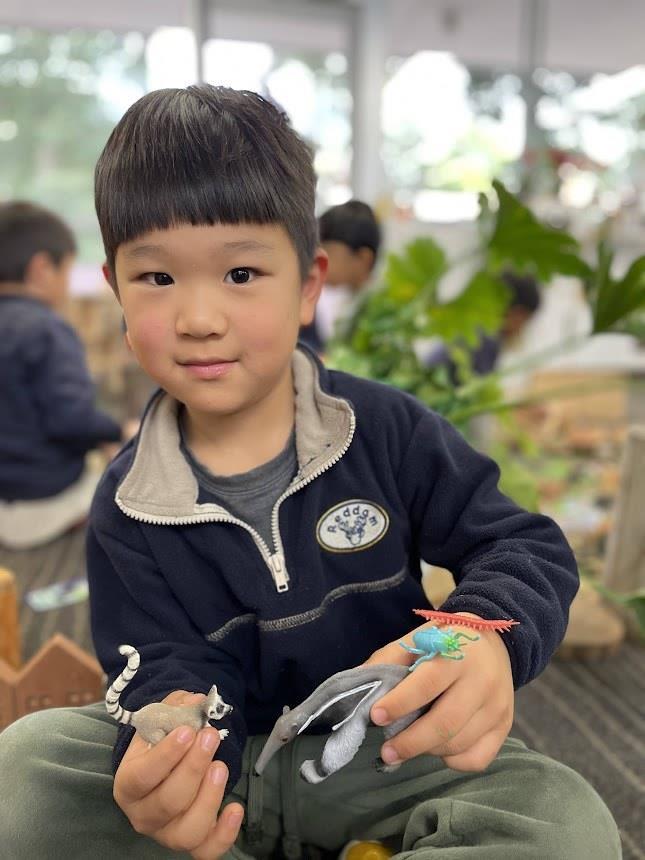

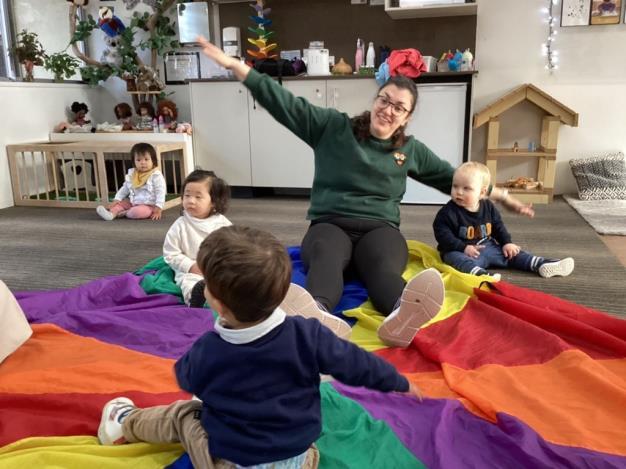
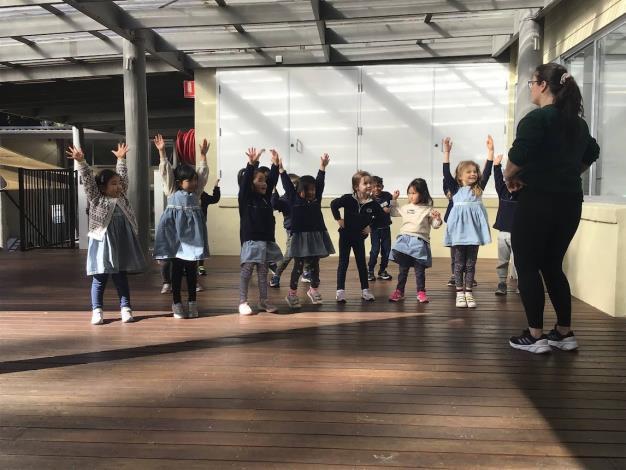
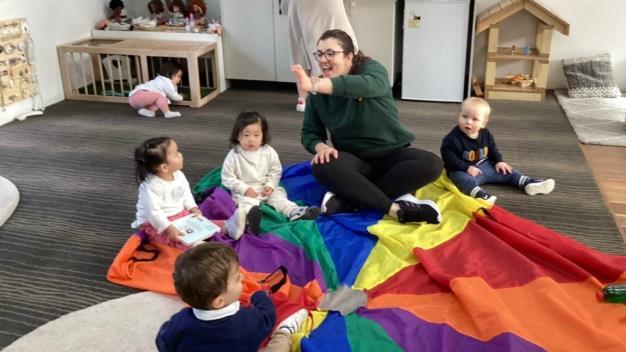
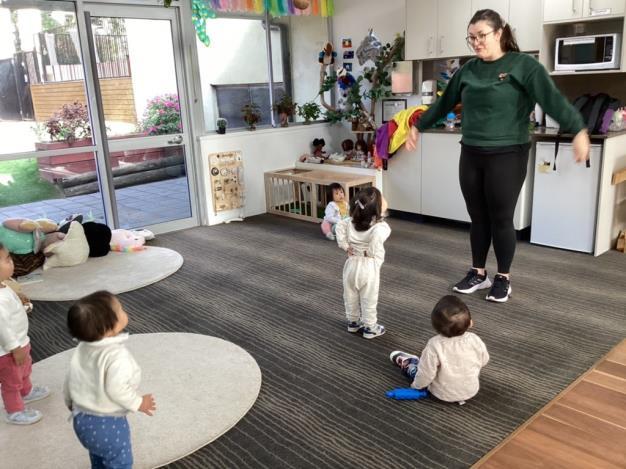
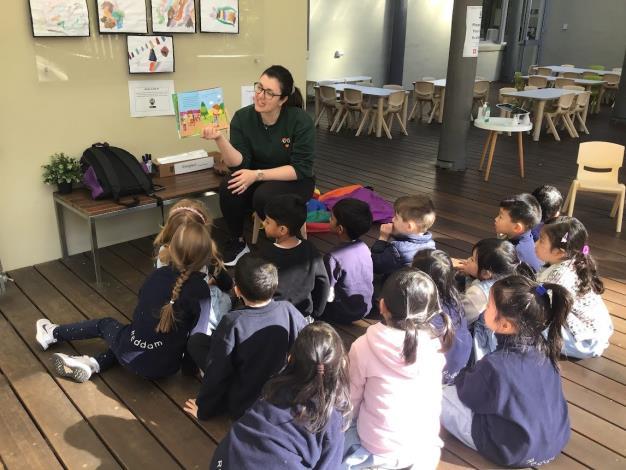
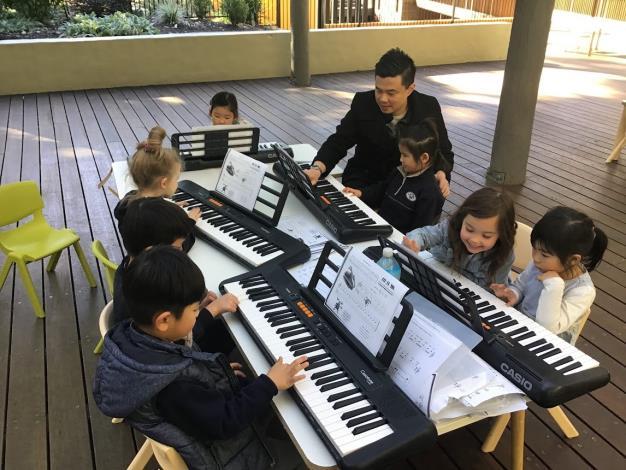

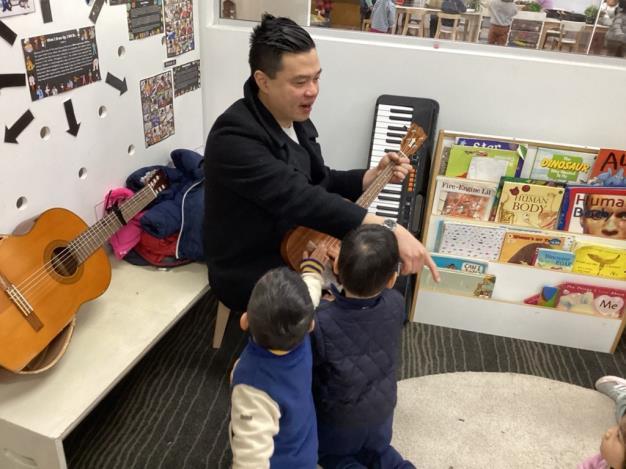 Music with Mr Alan
Music with Mr Alan
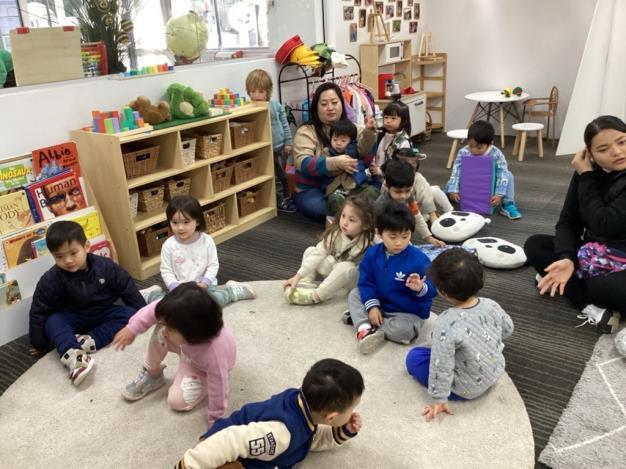
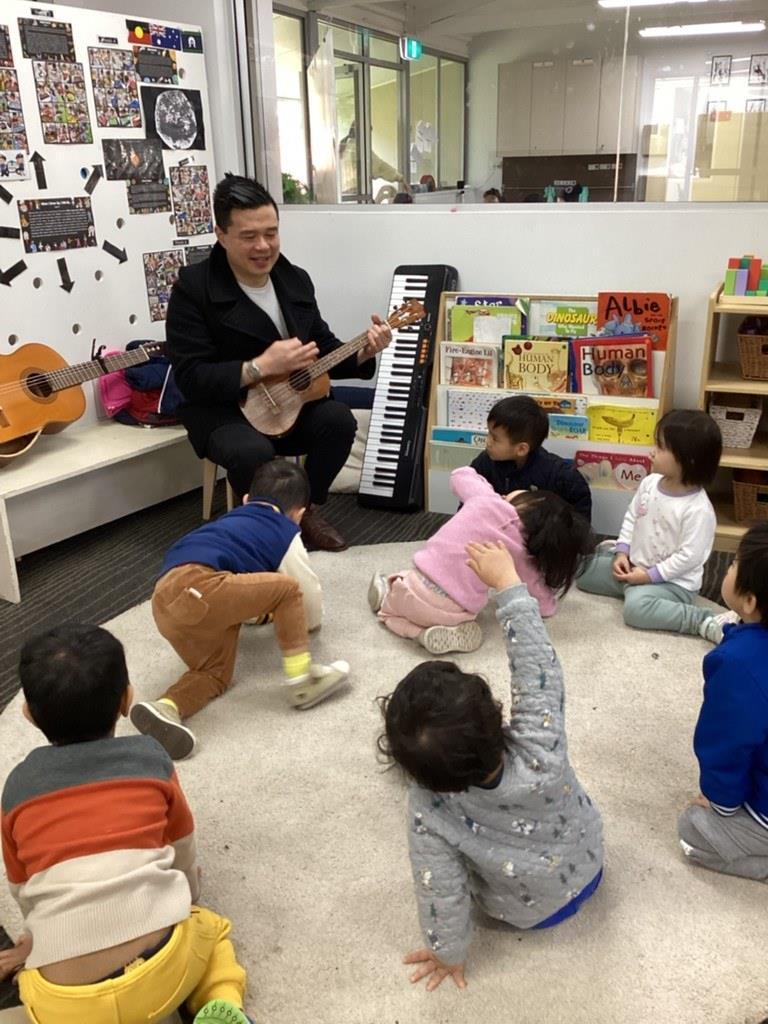

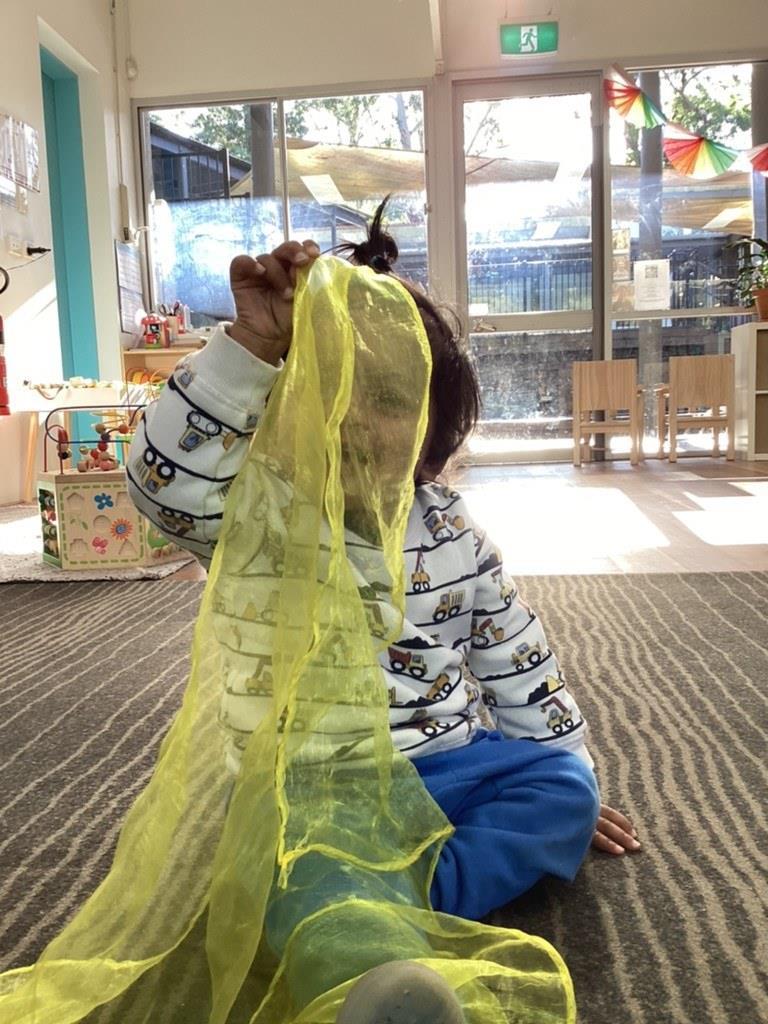 Mandarin with Miss Chloe
Mandarin with Miss Chloe
